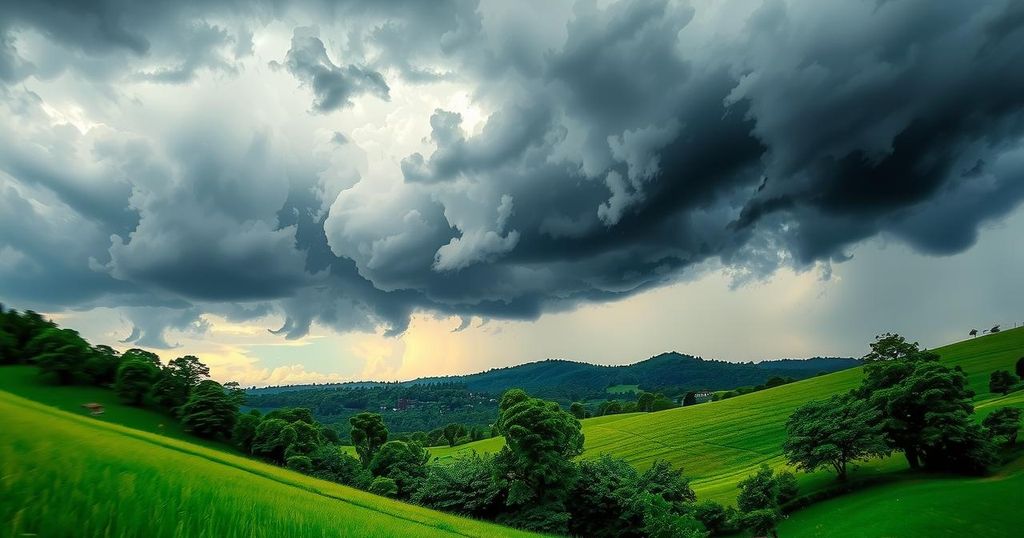The conflict in the DRC has resurfaced as M23 rebels advance towards Kinshasa, allegedly backed by Rwanda and Uganda. There is a growing military presence from neighboring countries, raising fears of a larger regional conflict. Analysts draw parallels to the previous Congo wars, emphasizing the need for regional dialogue and resolutions that prioritize the well-being of the Congolese people amidst historical grievances and resource exploitation.
The current resurgence of conflict in the Democratic Republic of the Congo (DRC) has evoked haunting memories of the earlier Congo wars, as M23 rebels advance towards Kinshasa, backed allegedly by Rwanda. Communities are either arming themselves for potential warfare or fleeing for safety after M23 seized crucial cities like Goma and Bukavu. The DRC government has responded with a $5 million reward for the capture of M23 leaders, though this has yet to hinder the rebel group’s momentum.
Simultaneously, Uganda has intensified military deployments along its border in Ituri province. The Ugandan army claims involvement in combating local armed groups, notably the Allied Democratic Forces (ADF) and the Cooperative for the Development of Congo (CODECO), which have inflicted significant casualties among civilians. The recent escalation of CODECO-related violence has compelled Uganda to bolster its military presence, raising concerns about the potential for a broader regional conflict.
Political analysts suggest that the increasing foreign military presence echoes the history of the Second Congo War, with the same principal nations involved but under altered circumstances. “We are indeed seeing a replica of the Second Congo War with the same actors but in slightly different configurations,” stated Paul Nantulya from the Africa Center for Strategic Studies, highlighting fears of an expanding conflict akin to historical events.
For over three decades, the DRC has been mired in conflict, resulting in millions of deaths and displacements fueled by ethnic tensions, resource exploitation, and political corruption. Rwanda’s prior invasions triggered both the First and Second Congo Wars, with claims surrounding the pursuit of Hutu genocidaires serving as justifications for intervention. However, after a dynamic shift in leadership, the involvement of external actors in the DRC’s internal affairs has remained a persistent issue.
The aftermath of the Congo wars has left a legacy of low-intensity violence; various reports accusing Rwandan and Ugandan forces have surfaced regarding exploitation of the DRC’s vast natural resources, including minerals vital for global supply chains. The International Court of Justice ruled against Uganda in 2022 for its part during the wars, ordering financial restitution, while ongoing legal disputes continue between the DRC and Rwanda regarding the latter’s support for M23.
The current conflict is marked by a familiar political landscape, with new coalitions emerging, such as the AFC-M23 alliance led by Corneille Nangaa. Regional dynamics illustrate significant military commitments from various countries; however, Uganda’s role remains contentious, with suspicions of collusion with M23 despite official denials.
The DRC’s rich mineral deposits, particularly in the Northern Kivu region, are significant contributors to the ongoing conflict’s funding mechanisms. Analysts contend that addressing the crisis necessitates a coordinated regional diplomatic effort, pressuring the DRC government to overcome internal corruption and legitimacy issues. The calls for national dialogue alongside international scrutiny into human rights violations signal important steps towards resolution, albeit challenges remain profound.
Ultimately, addressing the needs of the Congolese populace must take precedence in discussions regarding the conflict’s resolution. As analyst Kambale Musuvali articulated, “the people of the Congo have to be alive so that they can rebuild the country for the benefit of the African continent. That is why DRC needs a break.”
In summary, the resurgence of conflict in the DRC, marked by the resurgence of M23 and increased foreign military involvement, underscores a troubling cycle of violence rooted in historical grievances and exploitation. Efforts to resolve the crisis must focus on regional cooperation and the necessity of addressing internal DRC governance issues. The welfare of the Congolese people remains paramount, as stability is essential not only for the DRC but also for the entire African continent.
Original Source: www.aljazeera.com




